Management and Operation of an Organisation: A Detailed Report
VerifiedAdded on 2020/07/23
|11
|3596
|47
Report
AI Summary
This report provides a comprehensive overview of leadership and management within organizations. It begins by defining the roles of leaders and managers, differentiating their responsibilities, and highlighting key characteristics. The report then explores how leaders and managers adapt their roles in different situations, emphasizing the importance of situational leadership and crisis management. Various leadership theories, including situational leadership, system leadership, and contingency theory, are discussed, with an analysis of their practical applications. A significant portion of the report focuses on the case study of Marks and Spencer (M&S), examining the leadership practices within the company, the importance of operation management, and the factors influencing its business activities. The report concludes with a summary of the key findings and insights into effective organizational management.
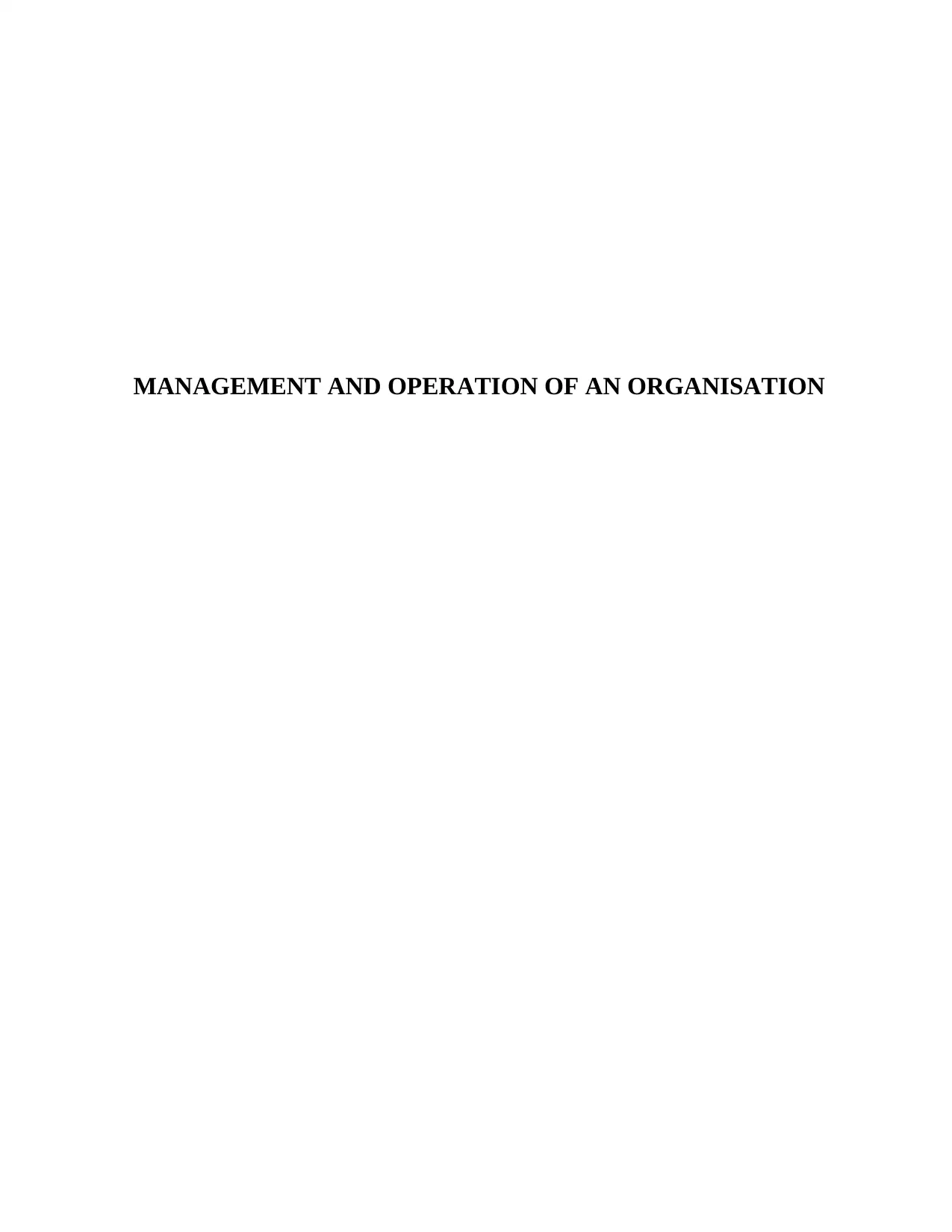
MANAGEMENT AND OPERATION OF AN ORGANISATION
Paraphrase This Document
Need a fresh take? Get an instant paraphrase of this document with our AI Paraphraser
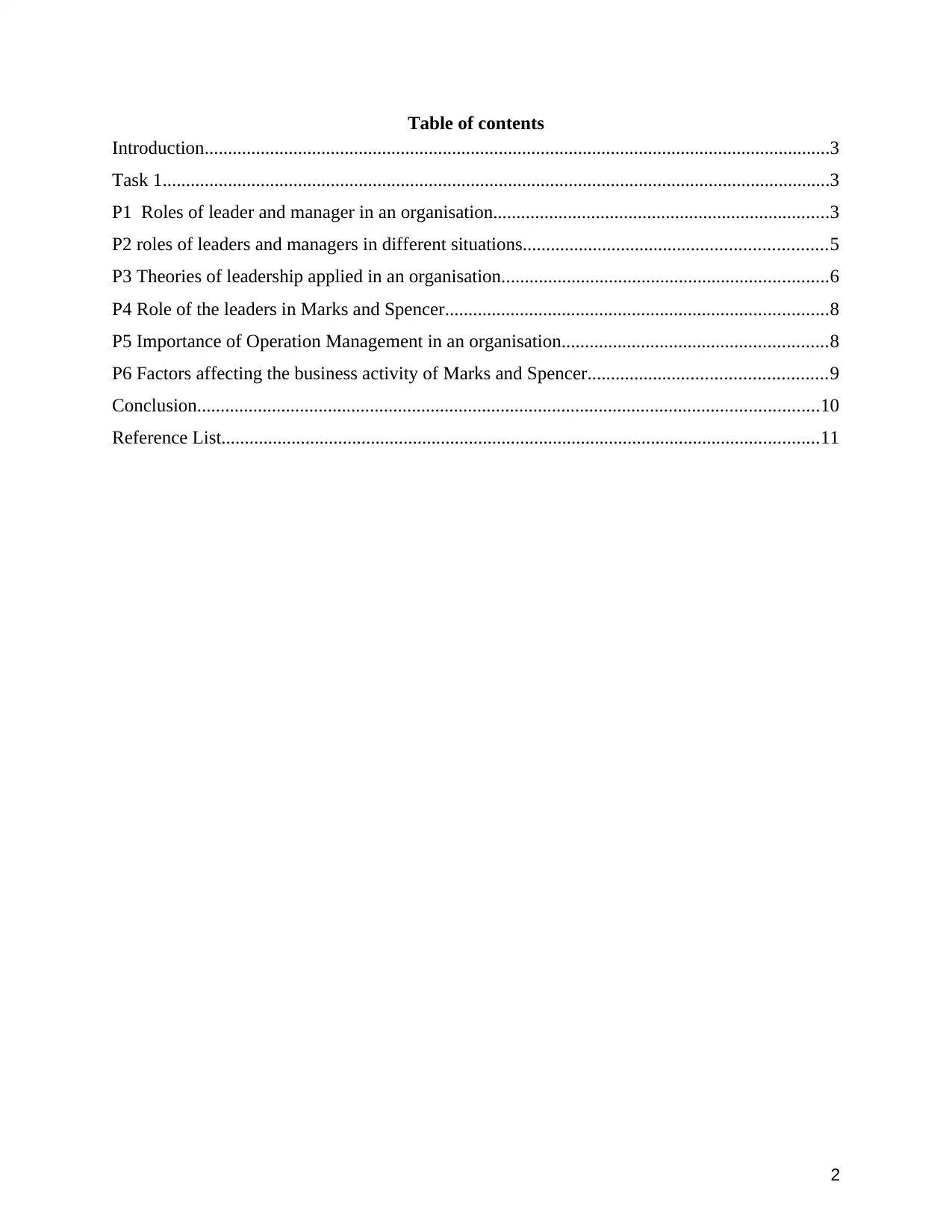
Table of contents
Introduction......................................................................................................................................3
Task 1...............................................................................................................................................3
P1 Roles of leader and manager in an organisation........................................................................3
P2 roles of leaders and managers in different situations.................................................................5
P3 Theories of leadership applied in an organisation......................................................................6
P4 Role of the leaders in Marks and Spencer..................................................................................8
P5 Importance of Operation Management in an organisation.........................................................8
P6 Factors affecting the business activity of Marks and Spencer...................................................9
Conclusion.....................................................................................................................................10
Reference List................................................................................................................................11
2
Introduction......................................................................................................................................3
Task 1...............................................................................................................................................3
P1 Roles of leader and manager in an organisation........................................................................3
P2 roles of leaders and managers in different situations.................................................................5
P3 Theories of leadership applied in an organisation......................................................................6
P4 Role of the leaders in Marks and Spencer..................................................................................8
P5 Importance of Operation Management in an organisation.........................................................8
P6 Factors affecting the business activity of Marks and Spencer...................................................9
Conclusion.....................................................................................................................................10
Reference List................................................................................................................................11
2
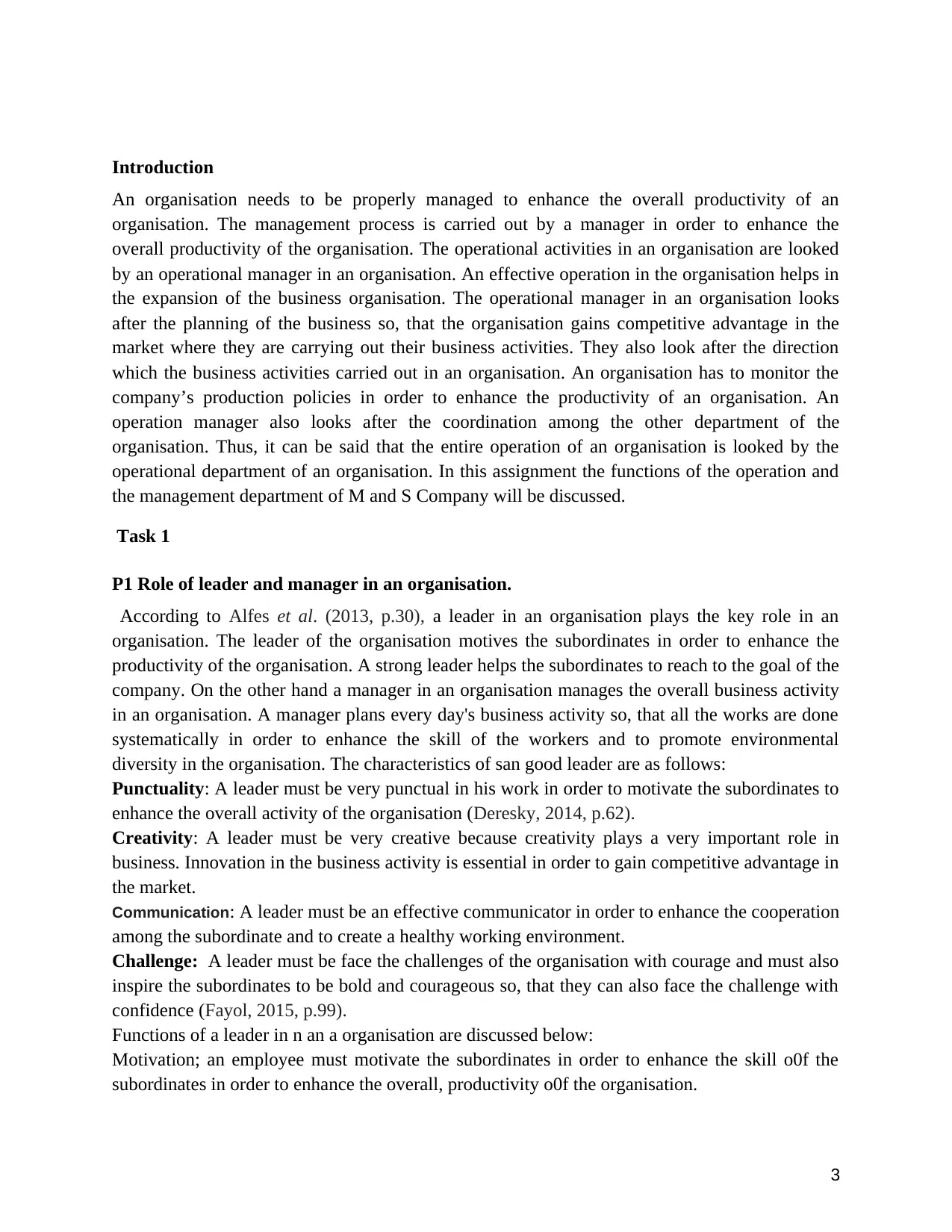
Introduction
An organisation needs to be properly managed to enhance the overall productivity of an
organisation. The management process is carried out by a manager in order to enhance the
overall productivity of the organisation. The operational activities in an organisation are looked
by an operational manager in an organisation. An effective operation in the organisation helps in
the expansion of the business organisation. The operational manager in an organisation looks
after the planning of the business so, that the organisation gains competitive advantage in the
market where they are carrying out their business activities. They also look after the direction
which the business activities carried out in an organisation. An organisation has to monitor the
company’s production policies in order to enhance the productivity of an organisation. An
operation manager also looks after the coordination among the other department of the
organisation. Thus, it can be said that the entire operation of an organisation is looked by the
operational department of an organisation. In this assignment the functions of the operation and
the management department of M and S Company will be discussed.
Task 1
P1 Role of leader and manager in an organisation.
According to Alfes et al. (2013, p.30), a leader in an organisation plays the key role in an
organisation. The leader of the organisation motives the subordinates in order to enhance the
productivity of the organisation. A strong leader helps the subordinates to reach to the goal of the
company. On the other hand a manager in an organisation manages the overall business activity
in an organisation. A manager plans every day's business activity so, that all the works are done
systematically in order to enhance the skill of the workers and to promote environmental
diversity in the organisation. The characteristics of san good leader are as follows:
Punctuality: A leader must be very punctual in his work in order to motivate the subordinates to
enhance the overall activity of the organisation (Deresky, 2014, p.62).
Creativity: A leader must be very creative because creativity plays a very important role in
business. Innovation in the business activity is essential in order to gain competitive advantage in
the market.
Communication: A leader must be an effective communicator in order to enhance the cooperation
among the subordinate and to create a healthy working environment.
Challenge: A leader must be face the challenges of the organisation with courage and must also
inspire the subordinates to be bold and courageous so, that they can also face the challenge with
confidence (Fayol, 2015, p.99).
Functions of a leader in n an a organisation are discussed below:
Motivation; an employee must motivate the subordinates in order to enhance the skill o0f the
subordinates in order to enhance the overall, productivity o0f the organisation.
3
An organisation needs to be properly managed to enhance the overall productivity of an
organisation. The management process is carried out by a manager in order to enhance the
overall productivity of the organisation. The operational activities in an organisation are looked
by an operational manager in an organisation. An effective operation in the organisation helps in
the expansion of the business organisation. The operational manager in an organisation looks
after the planning of the business so, that the organisation gains competitive advantage in the
market where they are carrying out their business activities. They also look after the direction
which the business activities carried out in an organisation. An organisation has to monitor the
company’s production policies in order to enhance the productivity of an organisation. An
operation manager also looks after the coordination among the other department of the
organisation. Thus, it can be said that the entire operation of an organisation is looked by the
operational department of an organisation. In this assignment the functions of the operation and
the management department of M and S Company will be discussed.
Task 1
P1 Role of leader and manager in an organisation.
According to Alfes et al. (2013, p.30), a leader in an organisation plays the key role in an
organisation. The leader of the organisation motives the subordinates in order to enhance the
productivity of the organisation. A strong leader helps the subordinates to reach to the goal of the
company. On the other hand a manager in an organisation manages the overall business activity
in an organisation. A manager plans every day's business activity so, that all the works are done
systematically in order to enhance the skill of the workers and to promote environmental
diversity in the organisation. The characteristics of san good leader are as follows:
Punctuality: A leader must be very punctual in his work in order to motivate the subordinates to
enhance the overall activity of the organisation (Deresky, 2014, p.62).
Creativity: A leader must be very creative because creativity plays a very important role in
business. Innovation in the business activity is essential in order to gain competitive advantage in
the market.
Communication: A leader must be an effective communicator in order to enhance the cooperation
among the subordinate and to create a healthy working environment.
Challenge: A leader must be face the challenges of the organisation with courage and must also
inspire the subordinates to be bold and courageous so, that they can also face the challenge with
confidence (Fayol, 2015, p.99).
Functions of a leader in n an a organisation are discussed below:
Motivation; an employee must motivate the subordinates in order to enhance the skill o0f the
subordinates in order to enhance the overall, productivity o0f the organisation.
3
⊘ This is a preview!⊘
Do you want full access?
Subscribe today to unlock all pages.

Trusted by 1+ million students worldwide
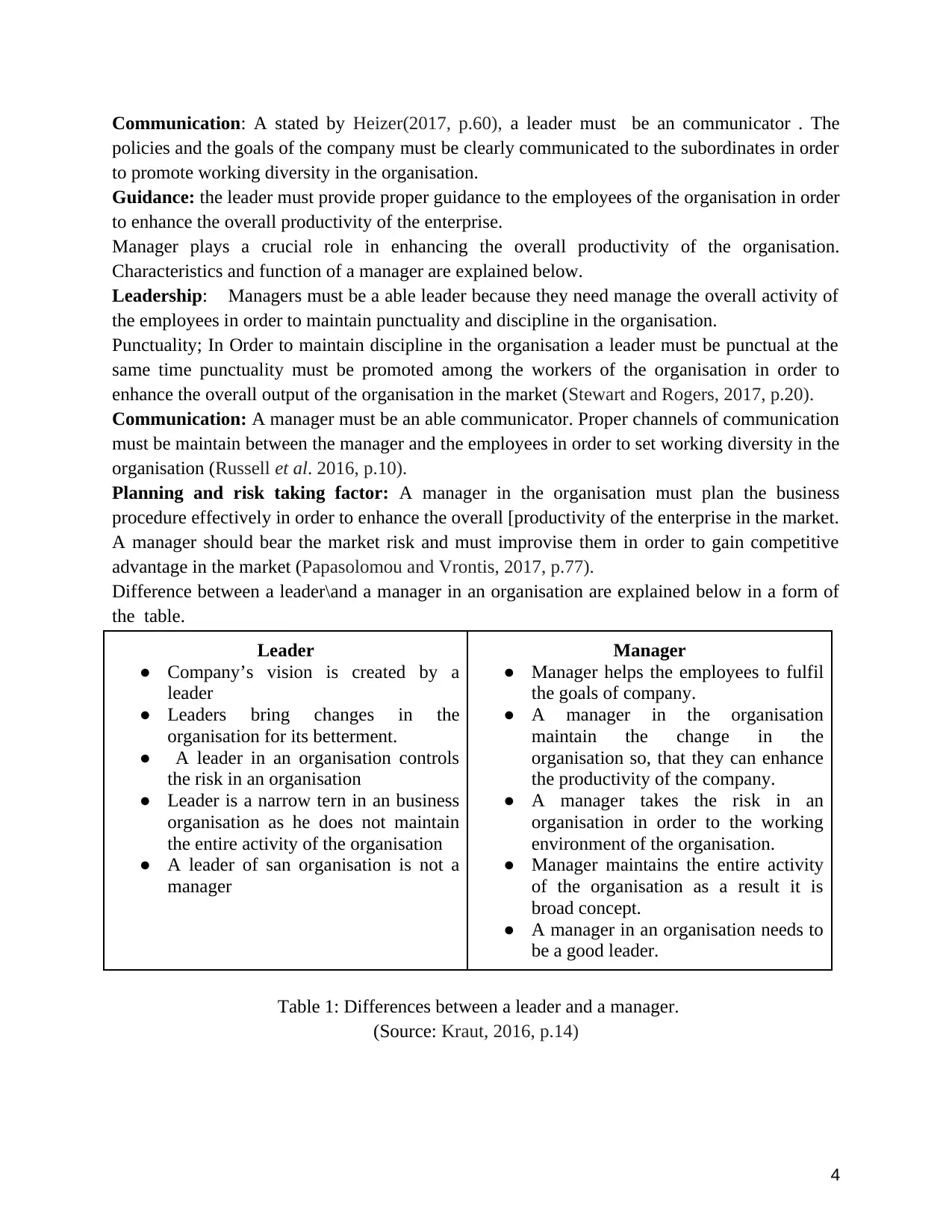
Communication: A stated by Heizer(2017, p.60), a leader must be an communicator . The
policies and the goals of the company must be clearly communicated to the subordinates in order
to promote working diversity in the organisation.
Guidance: the leader must provide proper guidance to the employees of the organisation in order
to enhance the overall productivity of the enterprise.
Manager plays a crucial role in enhancing the overall productivity of the organisation.
Characteristics and function of a manager are explained below.
Leadership: Managers must be a able leader because they need manage the overall activity of
the employees in order to maintain punctuality and discipline in the organisation.
Punctuality; In Order to maintain discipline in the organisation a leader must be punctual at the
same time punctuality must be promoted among the workers of the organisation in order to
enhance the overall output of the organisation in the market (Stewart and Rogers, 2017, p.20).
Communication: A manager must be an able communicator. Proper channels of communication
must be maintain between the manager and the employees in order to set working diversity in the
organisation (Russell et al. 2016, p.10).
Planning and risk taking factor: A manager in the organisation must plan the business
procedure effectively in order to enhance the overall [productivity of the enterprise in the market.
A manager should bear the market risk and must improvise them in order to gain competitive
advantage in the market (Papasolomou and Vrontis, 2017, p.77).
Difference between a leader\and a manager in an organisation are explained below in a form of
the table.
Leader
● Company’s vision is created by a
leader
● Leaders bring changes in the
organisation for its betterment.
● A leader in an organisation controls
the risk in an organisation
● Leader is a narrow tern in an business
organisation as he does not maintain
the entire activity of the organisation
● A leader of san organisation is not a
manager
Manager
● Manager helps the employees to fulfil
the goals of company.
● A manager in the organisation
maintain the change in the
organisation so, that they can enhance
the productivity of the company.
● A manager takes the risk in an
organisation in order to the working
environment of the organisation.
● Manager maintains the entire activity
of the organisation as a result it is
broad concept.
● A manager in an organisation needs to
be a good leader.
Table 1: Differences between a leader and a manager.
(Source: Kraut, 2016, p.14)
4
policies and the goals of the company must be clearly communicated to the subordinates in order
to promote working diversity in the organisation.
Guidance: the leader must provide proper guidance to the employees of the organisation in order
to enhance the overall productivity of the enterprise.
Manager plays a crucial role in enhancing the overall productivity of the organisation.
Characteristics and function of a manager are explained below.
Leadership: Managers must be a able leader because they need manage the overall activity of
the employees in order to maintain punctuality and discipline in the organisation.
Punctuality; In Order to maintain discipline in the organisation a leader must be punctual at the
same time punctuality must be promoted among the workers of the organisation in order to
enhance the overall output of the organisation in the market (Stewart and Rogers, 2017, p.20).
Communication: A manager must be an able communicator. Proper channels of communication
must be maintain between the manager and the employees in order to set working diversity in the
organisation (Russell et al. 2016, p.10).
Planning and risk taking factor: A manager in the organisation must plan the business
procedure effectively in order to enhance the overall [productivity of the enterprise in the market.
A manager should bear the market risk and must improvise them in order to gain competitive
advantage in the market (Papasolomou and Vrontis, 2017, p.77).
Difference between a leader\and a manager in an organisation are explained below in a form of
the table.
Leader
● Company’s vision is created by a
leader
● Leaders bring changes in the
organisation for its betterment.
● A leader in an organisation controls
the risk in an organisation
● Leader is a narrow tern in an business
organisation as he does not maintain
the entire activity of the organisation
● A leader of san organisation is not a
manager
Manager
● Manager helps the employees to fulfil
the goals of company.
● A manager in the organisation
maintain the change in the
organisation so, that they can enhance
the productivity of the company.
● A manager takes the risk in an
organisation in order to the working
environment of the organisation.
● Manager maintains the entire activity
of the organisation as a result it is
broad concept.
● A manager in an organisation needs to
be a good leader.
Table 1: Differences between a leader and a manager.
(Source: Kraut, 2016, p.14)
4
Paraphrase This Document
Need a fresh take? Get an instant paraphrase of this document with our AI Paraphraser
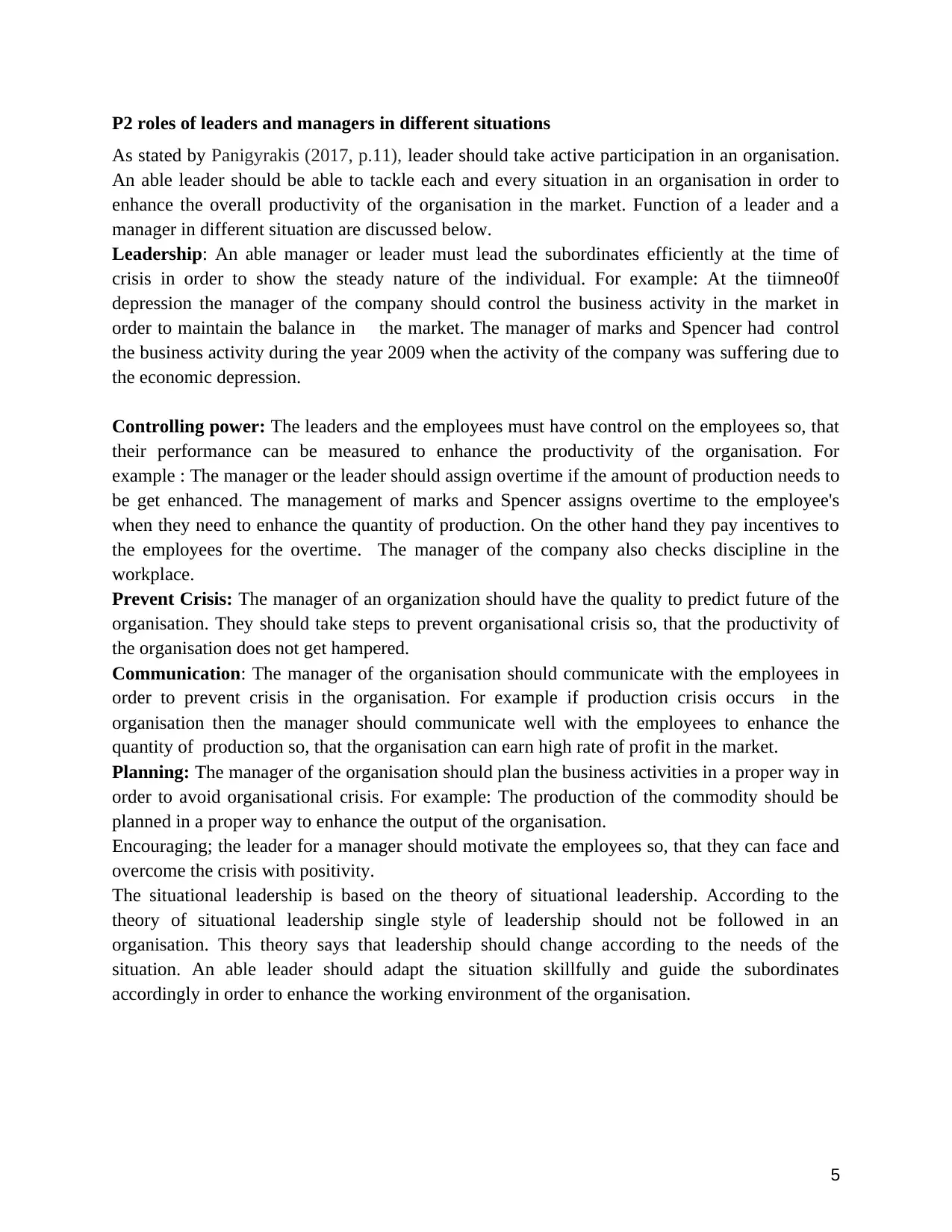
P2 roles of leaders and managers in different situations
As stated by Panigyrakis (2017, p.11), leader should take active participation in an organisation.
An able leader should be able to tackle each and every situation in an organisation in order to
enhance the overall productivity of the organisation in the market. Function of a leader and a
manager in different situation are discussed below.
Leadership: An able manager or leader must lead the subordinates efficiently at the time of
crisis in order to show the steady nature of the individual. For example: At the tiimneo0f
depression the manager of the company should control the business activity in the market in
order to maintain the balance in the market. The manager of marks and Spencer had control
the business activity during the year 2009 when the activity of the company was suffering due to
the economic depression.
Controlling power: The leaders and the employees must have control on the employees so, that
their performance can be measured to enhance the productivity of the organisation. For
example : The manager or the leader should assign overtime if the amount of production needs to
be get enhanced. The management of marks and Spencer assigns overtime to the employee's
when they need to enhance the quantity of production. On the other hand they pay incentives to
the employees for the overtime. The manager of the company also checks discipline in the
workplace.
Prevent Crisis: The manager of an organization should have the quality to predict future of the
organisation. They should take steps to prevent organisational crisis so, that the productivity of
the organisation does not get hampered.
Communication: The manager of the organisation should communicate with the employees in
order to prevent crisis in the organisation. For example if production crisis occurs in the
organisation then the manager should communicate well with the employees to enhance the
quantity of production so, that the organisation can earn high rate of profit in the market.
Planning: The manager of the organisation should plan the business activities in a proper way in
order to avoid organisational crisis. For example: The production of the commodity should be
planned in a proper way to enhance the output of the organisation.
Encouraging; the leader for a manager should motivate the employees so, that they can face and
overcome the crisis with positivity.
The situational leadership is based on the theory of situational leadership. According to the
theory of situational leadership single style of leadership should not be followed in an
organisation. This theory says that leadership should change according to the needs of the
situation. An able leader should adapt the situation skillfully and guide the subordinates
accordingly in order to enhance the working environment of the organisation.
5
As stated by Panigyrakis (2017, p.11), leader should take active participation in an organisation.
An able leader should be able to tackle each and every situation in an organisation in order to
enhance the overall productivity of the organisation in the market. Function of a leader and a
manager in different situation are discussed below.
Leadership: An able manager or leader must lead the subordinates efficiently at the time of
crisis in order to show the steady nature of the individual. For example: At the tiimneo0f
depression the manager of the company should control the business activity in the market in
order to maintain the balance in the market. The manager of marks and Spencer had control
the business activity during the year 2009 when the activity of the company was suffering due to
the economic depression.
Controlling power: The leaders and the employees must have control on the employees so, that
their performance can be measured to enhance the productivity of the organisation. For
example : The manager or the leader should assign overtime if the amount of production needs to
be get enhanced. The management of marks and Spencer assigns overtime to the employee's
when they need to enhance the quantity of production. On the other hand they pay incentives to
the employees for the overtime. The manager of the company also checks discipline in the
workplace.
Prevent Crisis: The manager of an organization should have the quality to predict future of the
organisation. They should take steps to prevent organisational crisis so, that the productivity of
the organisation does not get hampered.
Communication: The manager of the organisation should communicate with the employees in
order to prevent crisis in the organisation. For example if production crisis occurs in the
organisation then the manager should communicate well with the employees to enhance the
quantity of production so, that the organisation can earn high rate of profit in the market.
Planning: The manager of the organisation should plan the business activities in a proper way in
order to avoid organisational crisis. For example: The production of the commodity should be
planned in a proper way to enhance the output of the organisation.
Encouraging; the leader for a manager should motivate the employees so, that they can face and
overcome the crisis with positivity.
The situational leadership is based on the theory of situational leadership. According to the
theory of situational leadership single style of leadership should not be followed in an
organisation. This theory says that leadership should change according to the needs of the
situation. An able leader should adapt the situation skillfully and guide the subordinates
accordingly in order to enhance the working environment of the organisation.
5
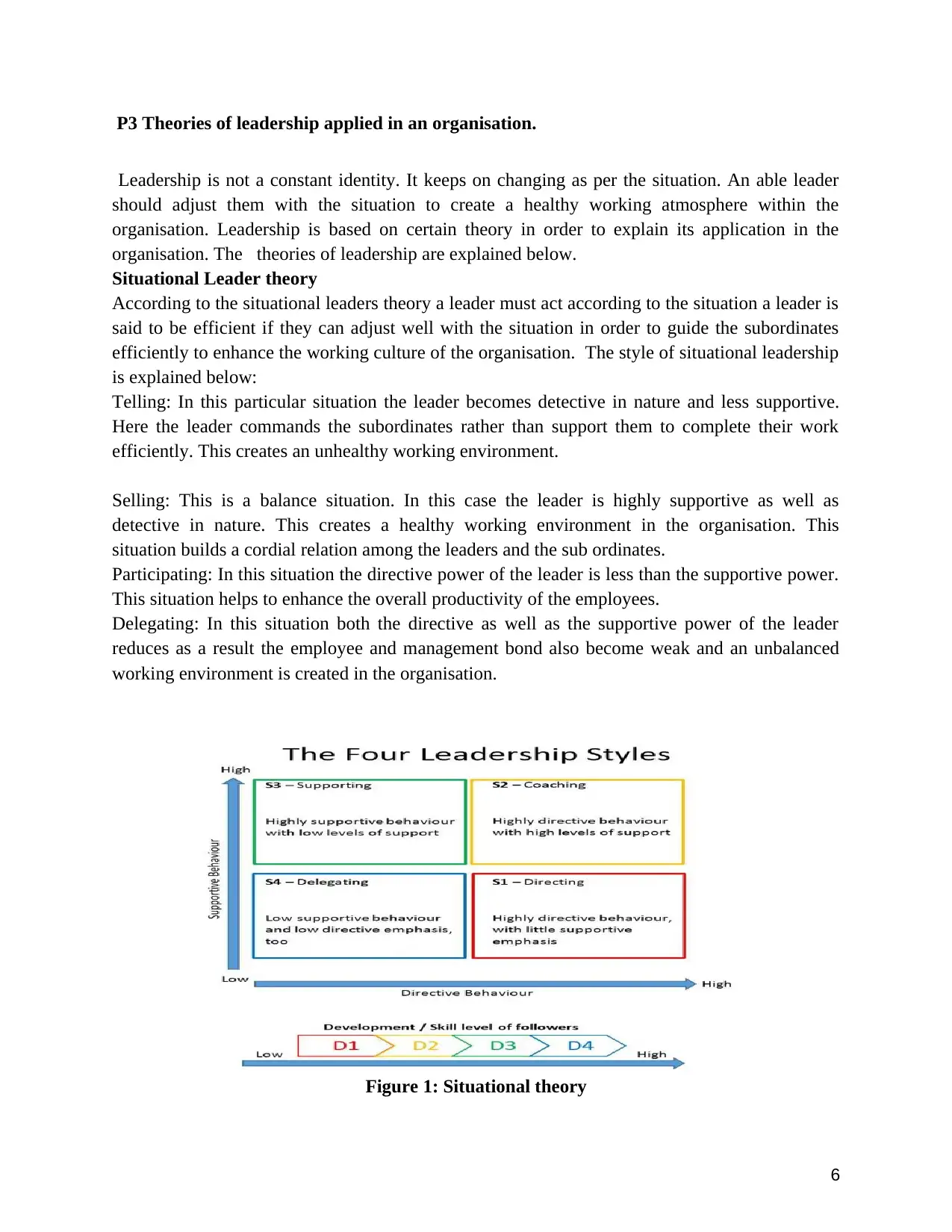
P3 Theories of leadership applied in an organisation.
Leadership is not a constant identity. It keeps on changing as per the situation. An able leader
should adjust them with the situation to create a healthy working atmosphere within the
organisation. Leadership is based on certain theory in order to explain its application in the
organisation. The theories of leadership are explained below.
Situational Leader theory
According to the situational leaders theory a leader must act according to the situation a leader is
said to be efficient if they can adjust well with the situation in order to guide the subordinates
efficiently to enhance the working culture of the organisation. The style of situational leadership
is explained below:
Telling: In this particular situation the leader becomes detective in nature and less supportive.
Here the leader commands the subordinates rather than support them to complete their work
efficiently. This creates an unhealthy working environment.
Selling: This is a balance situation. In this case the leader is highly supportive as well as
detective in nature. This creates a healthy working environment in the organisation. This
situation builds a cordial relation among the leaders and the sub ordinates.
Participating: In this situation the directive power of the leader is less than the supportive power.
This situation helps to enhance the overall productivity of the employees.
Delegating: In this situation both the directive as well as the supportive power of the leader
reduces as a result the employee and management bond also become weak and an unbalanced
working environment is created in the organisation.
Figure 1: Situational theory
6
Leadership is not a constant identity. It keeps on changing as per the situation. An able leader
should adjust them with the situation to create a healthy working atmosphere within the
organisation. Leadership is based on certain theory in order to explain its application in the
organisation. The theories of leadership are explained below.
Situational Leader theory
According to the situational leaders theory a leader must act according to the situation a leader is
said to be efficient if they can adjust well with the situation in order to guide the subordinates
efficiently to enhance the working culture of the organisation. The style of situational leadership
is explained below:
Telling: In this particular situation the leader becomes detective in nature and less supportive.
Here the leader commands the subordinates rather than support them to complete their work
efficiently. This creates an unhealthy working environment.
Selling: This is a balance situation. In this case the leader is highly supportive as well as
detective in nature. This creates a healthy working environment in the organisation. This
situation builds a cordial relation among the leaders and the sub ordinates.
Participating: In this situation the directive power of the leader is less than the supportive power.
This situation helps to enhance the overall productivity of the employees.
Delegating: In this situation both the directive as well as the supportive power of the leader
reduces as a result the employee and management bond also become weak and an unbalanced
working environment is created in the organisation.
Figure 1: Situational theory
6
⊘ This is a preview!⊘
Do you want full access?
Subscribe today to unlock all pages.

Trusted by 1+ million students worldwide
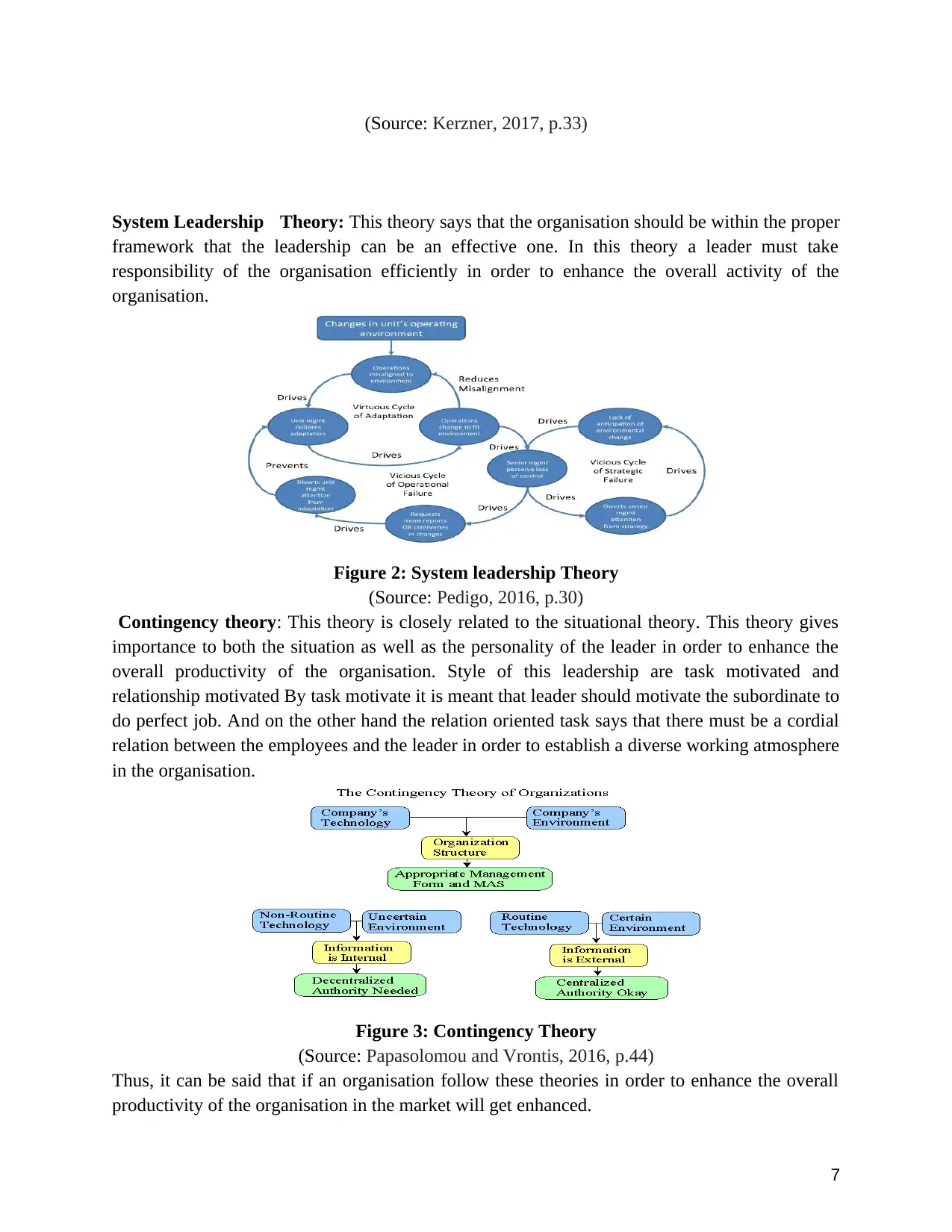
(Source: Kerzner, 2017, p.33)
System Leadership Theory: This theory says that the organisation should be within the proper
framework that the leadership can be an effective one. In this theory a leader must take
responsibility of the organisation efficiently in order to enhance the overall activity of the
organisation.
Figure 2: System leadership Theory
(Source: Pedigo, 2016, p.30)
Contingency theory: This theory is closely related to the situational theory. This theory gives
importance to both the situation as well as the personality of the leader in order to enhance the
overall productivity of the organisation. Style of this leadership are task motivated and
relationship motivated By task motivate it is meant that leader should motivate the subordinate to
do perfect job. And on the other hand the relation oriented task says that there must be a cordial
relation between the employees and the leader in order to establish a diverse working atmosphere
in the organisation.
Figure 3: Contingency Theory
(Source: Papasolomou and Vrontis, 2016, p.44)
Thus, it can be said that if an organisation follow these theories in order to enhance the overall
productivity of the organisation in the market will get enhanced.
7
System Leadership Theory: This theory says that the organisation should be within the proper
framework that the leadership can be an effective one. In this theory a leader must take
responsibility of the organisation efficiently in order to enhance the overall activity of the
organisation.
Figure 2: System leadership Theory
(Source: Pedigo, 2016, p.30)
Contingency theory: This theory is closely related to the situational theory. This theory gives
importance to both the situation as well as the personality of the leader in order to enhance the
overall productivity of the organisation. Style of this leadership are task motivated and
relationship motivated By task motivate it is meant that leader should motivate the subordinate to
do perfect job. And on the other hand the relation oriented task says that there must be a cordial
relation between the employees and the leader in order to establish a diverse working atmosphere
in the organisation.
Figure 3: Contingency Theory
(Source: Papasolomou and Vrontis, 2016, p.44)
Thus, it can be said that if an organisation follow these theories in order to enhance the overall
productivity of the organisation in the market will get enhanced.
7
Paraphrase This Document
Need a fresh take? Get an instant paraphrase of this document with our AI Paraphraser
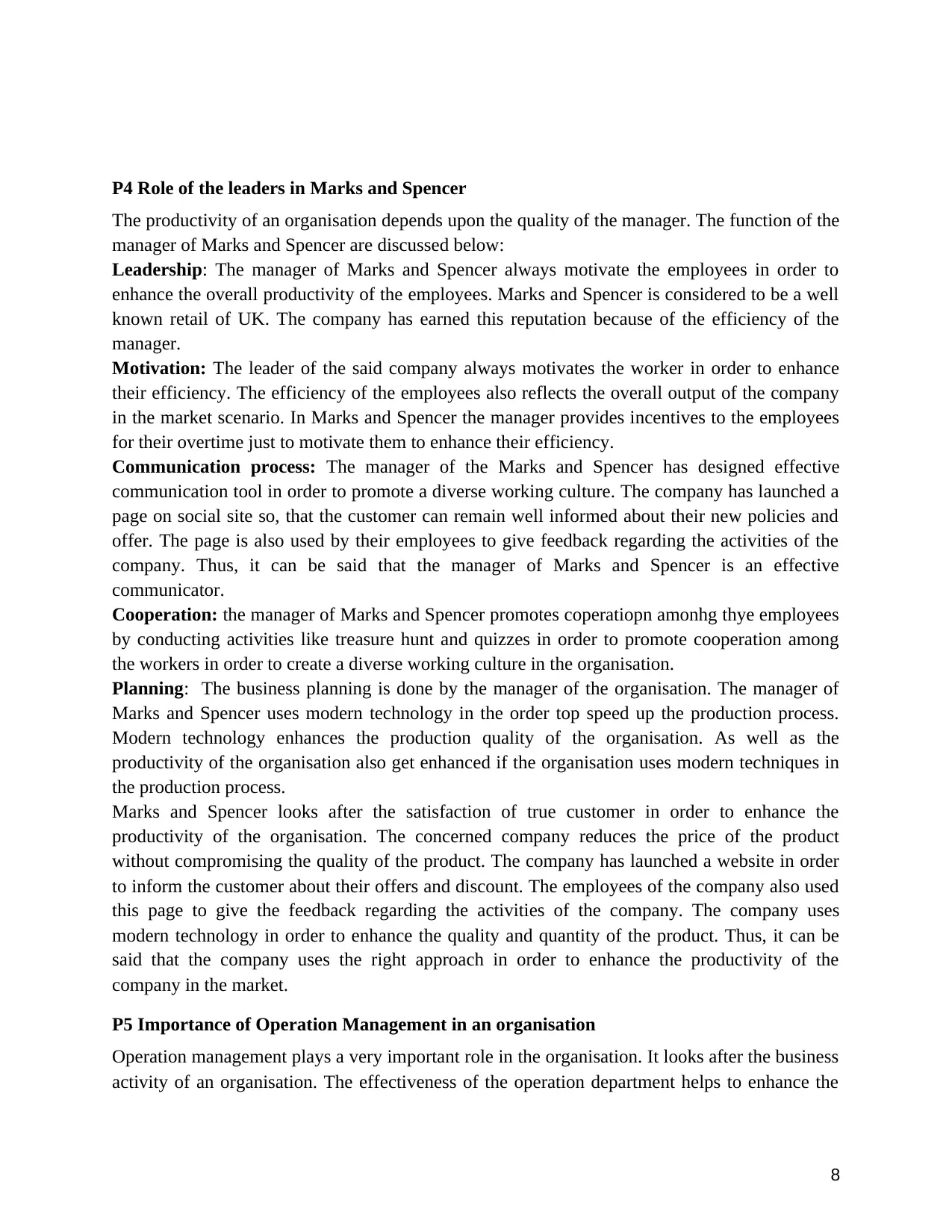
P4 Role of the leaders in Marks and Spencer
The productivity of an organisation depends upon the quality of the manager. The function of the
manager of Marks and Spencer are discussed below:
Leadership: The manager of Marks and Spencer always motivate the employees in order to
enhance the overall productivity of the employees. Marks and Spencer is considered to be a well
known retail of UK. The company has earned this reputation because of the efficiency of the
manager.
Motivation: The leader of the said company always motivates the worker in order to enhance
their efficiency. The efficiency of the employees also reflects the overall output of the company
in the market scenario. In Marks and Spencer the manager provides incentives to the employees
for their overtime just to motivate them to enhance their efficiency.
Communication process: The manager of the Marks and Spencer has designed effective
communication tool in order to promote a diverse working culture. The company has launched a
page on social site so, that the customer can remain well informed about their new policies and
offer. The page is also used by their employees to give feedback regarding the activities of the
company. Thus, it can be said that the manager of Marks and Spencer is an effective
communicator.
Cooperation: the manager of Marks and Spencer promotes coperatiopn amonhg thye employees
by conducting activities like treasure hunt and quizzes in order to promote cooperation among
the workers in order to create a diverse working culture in the organisation.
Planning: The business planning is done by the manager of the organisation. The manager of
Marks and Spencer uses modern technology in the order top speed up the production process.
Modern technology enhances the production quality of the organisation. As well as the
productivity of the organisation also get enhanced if the organisation uses modern techniques in
the production process.
Marks and Spencer looks after the satisfaction of true customer in order to enhance the
productivity of the organisation. The concerned company reduces the price of the product
without compromising the quality of the product. The company has launched a website in order
to inform the customer about their offers and discount. The employees of the company also used
this page to give the feedback regarding the activities of the company. The company uses
modern technology in order to enhance the quality and quantity of the product. Thus, it can be
said that the company uses the right approach in order to enhance the productivity of the
company in the market.
P5 Importance of Operation Management in an organisation
Operation management plays a very important role in the organisation. It looks after the business
activity of an organisation. The effectiveness of the operation department helps to enhance the
8
The productivity of an organisation depends upon the quality of the manager. The function of the
manager of Marks and Spencer are discussed below:
Leadership: The manager of Marks and Spencer always motivate the employees in order to
enhance the overall productivity of the employees. Marks and Spencer is considered to be a well
known retail of UK. The company has earned this reputation because of the efficiency of the
manager.
Motivation: The leader of the said company always motivates the worker in order to enhance
their efficiency. The efficiency of the employees also reflects the overall output of the company
in the market scenario. In Marks and Spencer the manager provides incentives to the employees
for their overtime just to motivate them to enhance their efficiency.
Communication process: The manager of the Marks and Spencer has designed effective
communication tool in order to promote a diverse working culture. The company has launched a
page on social site so, that the customer can remain well informed about their new policies and
offer. The page is also used by their employees to give feedback regarding the activities of the
company. Thus, it can be said that the manager of Marks and Spencer is an effective
communicator.
Cooperation: the manager of Marks and Spencer promotes coperatiopn amonhg thye employees
by conducting activities like treasure hunt and quizzes in order to promote cooperation among
the workers in order to create a diverse working culture in the organisation.
Planning: The business planning is done by the manager of the organisation. The manager of
Marks and Spencer uses modern technology in the order top speed up the production process.
Modern technology enhances the production quality of the organisation. As well as the
productivity of the organisation also get enhanced if the organisation uses modern techniques in
the production process.
Marks and Spencer looks after the satisfaction of true customer in order to enhance the
productivity of the organisation. The concerned company reduces the price of the product
without compromising the quality of the product. The company has launched a website in order
to inform the customer about their offers and discount. The employees of the company also used
this page to give the feedback regarding the activities of the company. The company uses
modern technology in order to enhance the quality and quantity of the product. Thus, it can be
said that the company uses the right approach in order to enhance the productivity of the
company in the market.
P5 Importance of Operation Management in an organisation
Operation management plays a very important role in the organisation. It looks after the business
activity of an organisation. The effectiveness of the operation department helps to enhance the
8
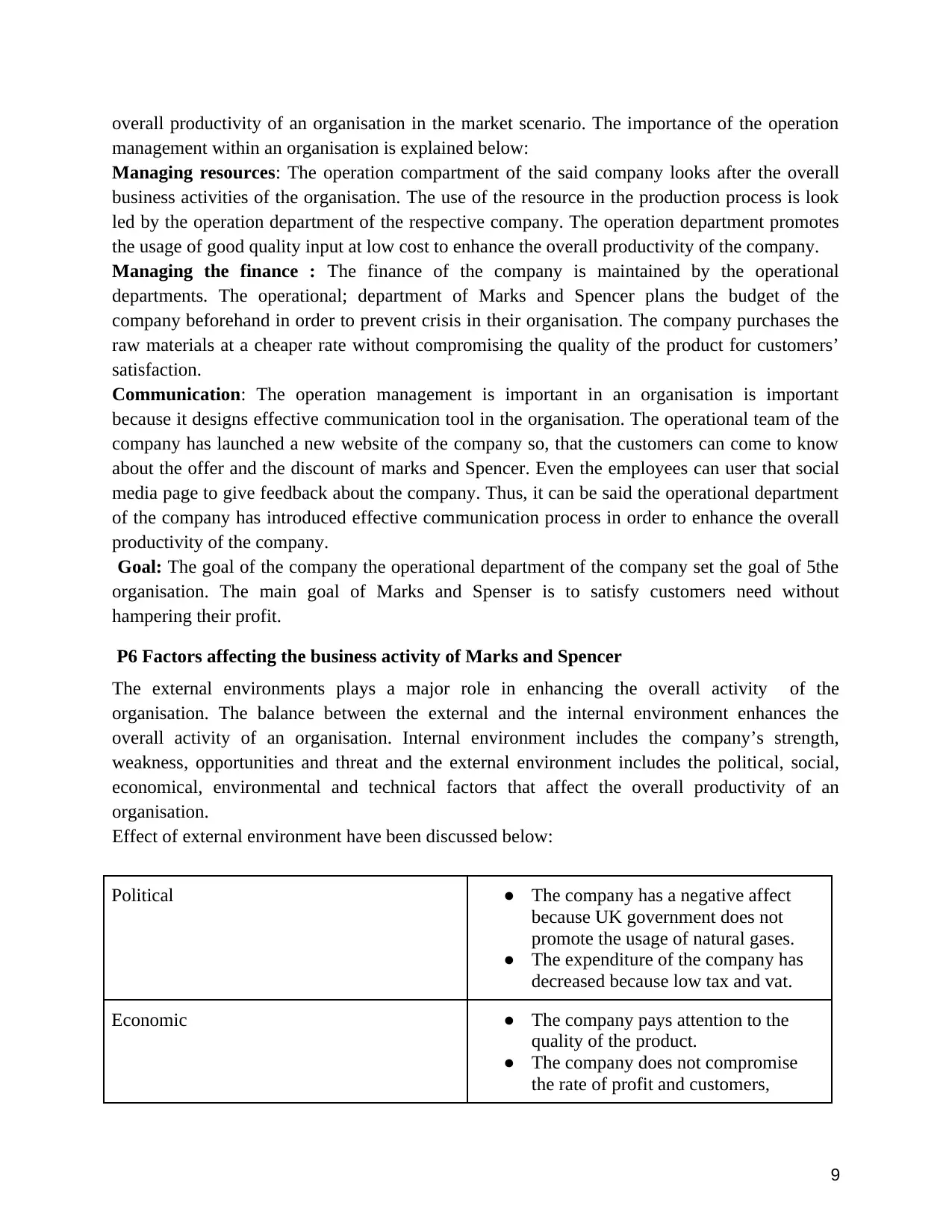
overall productivity of an organisation in the market scenario. The importance of the operation
management within an organisation is explained below:
Managing resources: The operation compartment of the said company looks after the overall
business activities of the organisation. The use of the resource in the production process is look
led by the operation department of the respective company. The operation department promotes
the usage of good quality input at low cost to enhance the overall productivity of the company.
Managing the finance : The finance of the company is maintained by the operational
departments. The operational; department of Marks and Spencer plans the budget of the
company beforehand in order to prevent crisis in their organisation. The company purchases the
raw materials at a cheaper rate without compromising the quality of the product for customers’
satisfaction.
Communication: The operation management is important in an organisation is important
because it designs effective communication tool in the organisation. The operational team of the
company has launched a new website of the company so, that the customers can come to know
about the offer and the discount of marks and Spencer. Even the employees can user that social
media page to give feedback about the company. Thus, it can be said the operational department
of the company has introduced effective communication process in order to enhance the overall
productivity of the company.
Goal: The goal of the company the operational department of the company set the goal of 5the
organisation. The main goal of Marks and Spenser is to satisfy customers need without
hampering their profit.
P6 Factors affecting the business activity of Marks and Spencer
The external environments plays a major role in enhancing the overall activity of the
organisation. The balance between the external and the internal environment enhances the
overall activity of an organisation. Internal environment includes the company’s strength,
weakness, opportunities and threat and the external environment includes the political, social,
economical, environmental and technical factors that affect the overall productivity of an
organisation.
Effect of external environment have been discussed below:
Political ● The company has a negative affect
because UK government does not
promote the usage of natural gases.
● The expenditure of the company has
decreased because low tax and vat.
Economic ● The company pays attention to the
quality of the product.
● The company does not compromise
the rate of profit and customers,
9
management within an organisation is explained below:
Managing resources: The operation compartment of the said company looks after the overall
business activities of the organisation. The use of the resource in the production process is look
led by the operation department of the respective company. The operation department promotes
the usage of good quality input at low cost to enhance the overall productivity of the company.
Managing the finance : The finance of the company is maintained by the operational
departments. The operational; department of Marks and Spencer plans the budget of the
company beforehand in order to prevent crisis in their organisation. The company purchases the
raw materials at a cheaper rate without compromising the quality of the product for customers’
satisfaction.
Communication: The operation management is important in an organisation is important
because it designs effective communication tool in the organisation. The operational team of the
company has launched a new website of the company so, that the customers can come to know
about the offer and the discount of marks and Spencer. Even the employees can user that social
media page to give feedback about the company. Thus, it can be said the operational department
of the company has introduced effective communication process in order to enhance the overall
productivity of the company.
Goal: The goal of the company the operational department of the company set the goal of 5the
organisation. The main goal of Marks and Spenser is to satisfy customers need without
hampering their profit.
P6 Factors affecting the business activity of Marks and Spencer
The external environments plays a major role in enhancing the overall activity of the
organisation. The balance between the external and the internal environment enhances the
overall activity of an organisation. Internal environment includes the company’s strength,
weakness, opportunities and threat and the external environment includes the political, social,
economical, environmental and technical factors that affect the overall productivity of an
organisation.
Effect of external environment have been discussed below:
Political ● The company has a negative affect
because UK government does not
promote the usage of natural gases.
● The expenditure of the company has
decreased because low tax and vat.
Economic ● The company pays attention to the
quality of the product.
● The company does not compromise
the rate of profit and customers,
9
⊘ This is a preview!⊘
Do you want full access?
Subscribe today to unlock all pages.

Trusted by 1+ million students worldwide
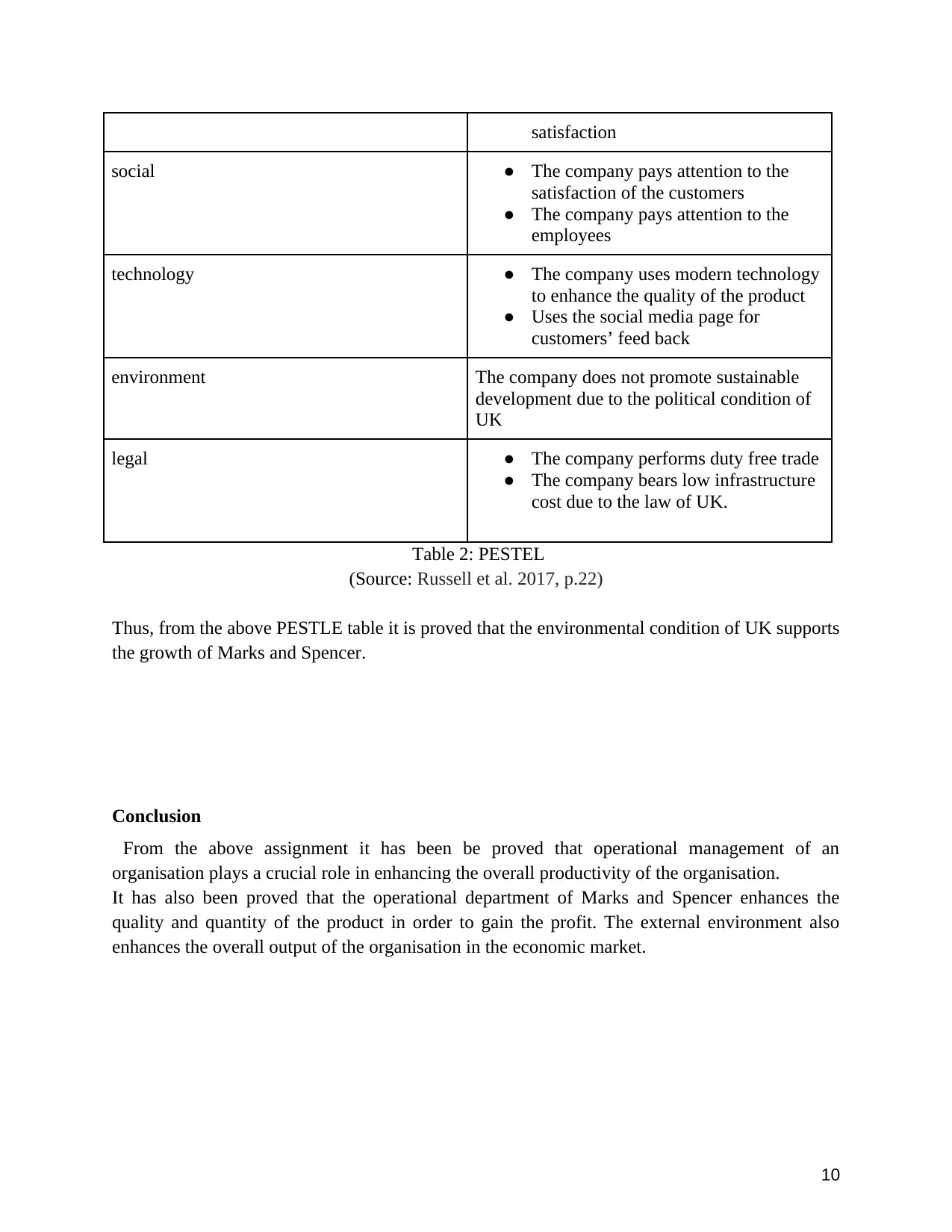
satisfaction
social ● The company pays attention to the
satisfaction of the customers
● The company pays attention to the
employees
technology ● The company uses modern technology
to enhance the quality of the product
● Uses the social media page for
customers’ feed back
environment The company does not promote sustainable
development due to the political condition of
UK
legal ● The company performs duty free trade
● The company bears low infrastructure
cost due to the law of UK.
Table 2: PESTEL
(Source: Russell et al. 2017, p.22)
Thus, from the above PESTLE table it is proved that the environmental condition of UK supports
the growth of Marks and Spencer.
Conclusion
From the above assignment it has been be proved that operational management of an
organisation plays a crucial role in enhancing the overall productivity of the organisation.
It has also been proved that the operational department of Marks and Spencer enhances the
quality and quantity of the product in order to gain the profit. The external environment also
enhances the overall output of the organisation in the economic market.
10
social ● The company pays attention to the
satisfaction of the customers
● The company pays attention to the
employees
technology ● The company uses modern technology
to enhance the quality of the product
● Uses the social media page for
customers’ feed back
environment The company does not promote sustainable
development due to the political condition of
UK
legal ● The company performs duty free trade
● The company bears low infrastructure
cost due to the law of UK.
Table 2: PESTEL
(Source: Russell et al. 2017, p.22)
Thus, from the above PESTLE table it is proved that the environmental condition of UK supports
the growth of Marks and Spencer.
Conclusion
From the above assignment it has been be proved that operational management of an
organisation plays a crucial role in enhancing the overall productivity of the organisation.
It has also been proved that the operational department of Marks and Spencer enhances the
quality and quantity of the product in order to gain the profit. The external environment also
enhances the overall output of the organisation in the economic market.
10
Paraphrase This Document
Need a fresh take? Get an instant paraphrase of this document with our AI Paraphraser
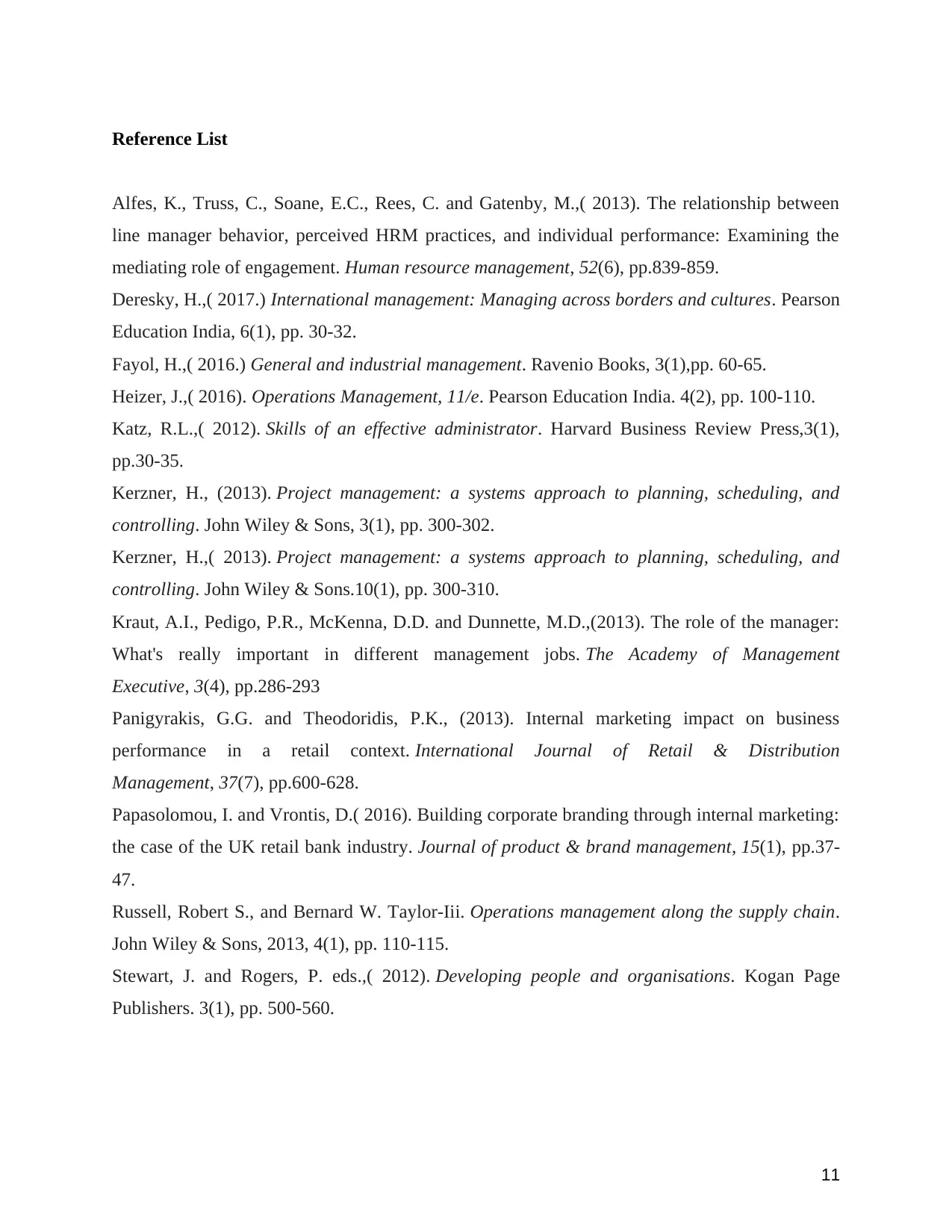
Reference List
Alfes, K., Truss, C., Soane, E.C., Rees, C. and Gatenby, M.,( 2013). The relationship between
line manager behavior, perceived HRM practices, and individual performance: Examining the
mediating role of engagement. Human resource management, 52(6), pp.839-859.
Deresky, H.,( 2017.) International management: Managing across borders and cultures. Pearson
Education India, 6(1), pp. 30-32.
Fayol, H.,( 2016.) General and industrial management. Ravenio Books, 3(1),pp. 60-65.
Heizer, J.,( 2016). Operations Management, 11/e. Pearson Education India. 4(2), pp. 100-110.
Katz, R.L.,( 2012). Skills of an effective administrator. Harvard Business Review Press,3(1),
pp.30-35.
Kerzner, H., (2013). Project management: a systems approach to planning, scheduling, and
controlling. John Wiley & Sons, 3(1), pp. 300-302.
Kerzner, H.,( 2013). Project management: a systems approach to planning, scheduling, and
controlling. John Wiley & Sons.10(1), pp. 300-310.
Kraut, A.I., Pedigo, P.R., McKenna, D.D. and Dunnette, M.D.,(2013). The role of the manager:
What's really important in different management jobs. The Academy of Management
Executive, 3(4), pp.286-293
Panigyrakis, G.G. and Theodoridis, P.K., (2013). Internal marketing impact on business
performance in a retail context. International Journal of Retail & Distribution
Management, 37(7), pp.600-628.
Papasolomou, I. and Vrontis, D.( 2016). Building corporate branding through internal marketing:
the case of the UK retail bank industry. Journal of product & brand management, 15(1), pp.37-
47.
Russell, Robert S., and Bernard W. Taylor-Iii. Operations management along the supply chain.
John Wiley & Sons, 2013, 4(1), pp. 110-115.
Stewart, J. and Rogers, P. eds.,( 2012). Developing people and organisations. Kogan Page
Publishers. 3(1), pp. 500-560.
11
Alfes, K., Truss, C., Soane, E.C., Rees, C. and Gatenby, M.,( 2013). The relationship between
line manager behavior, perceived HRM practices, and individual performance: Examining the
mediating role of engagement. Human resource management, 52(6), pp.839-859.
Deresky, H.,( 2017.) International management: Managing across borders and cultures. Pearson
Education India, 6(1), pp. 30-32.
Fayol, H.,( 2016.) General and industrial management. Ravenio Books, 3(1),pp. 60-65.
Heizer, J.,( 2016). Operations Management, 11/e. Pearson Education India. 4(2), pp. 100-110.
Katz, R.L.,( 2012). Skills of an effective administrator. Harvard Business Review Press,3(1),
pp.30-35.
Kerzner, H., (2013). Project management: a systems approach to planning, scheduling, and
controlling. John Wiley & Sons, 3(1), pp. 300-302.
Kerzner, H.,( 2013). Project management: a systems approach to planning, scheduling, and
controlling. John Wiley & Sons.10(1), pp. 300-310.
Kraut, A.I., Pedigo, P.R., McKenna, D.D. and Dunnette, M.D.,(2013). The role of the manager:
What's really important in different management jobs. The Academy of Management
Executive, 3(4), pp.286-293
Panigyrakis, G.G. and Theodoridis, P.K., (2013). Internal marketing impact on business
performance in a retail context. International Journal of Retail & Distribution
Management, 37(7), pp.600-628.
Papasolomou, I. and Vrontis, D.( 2016). Building corporate branding through internal marketing:
the case of the UK retail bank industry. Journal of product & brand management, 15(1), pp.37-
47.
Russell, Robert S., and Bernard W. Taylor-Iii. Operations management along the supply chain.
John Wiley & Sons, 2013, 4(1), pp. 110-115.
Stewart, J. and Rogers, P. eds.,( 2012). Developing people and organisations. Kogan Page
Publishers. 3(1), pp. 500-560.
11
1 out of 11
Related Documents
Your All-in-One AI-Powered Toolkit for Academic Success.
+13062052269
info@desklib.com
Available 24*7 on WhatsApp / Email
![[object Object]](/_next/static/media/star-bottom.7253800d.svg)
Unlock your academic potential
Copyright © 2020–2026 A2Z Services. All Rights Reserved. Developed and managed by ZUCOL.





